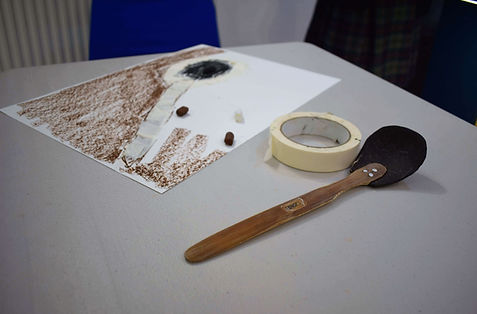Recipes for resilience: The complex meanings behind food-related objects
NICOLE-JAMEELAH SHODUNKE, MARTA LOMZA, MIRIAM LAIRD, KIRAN BHANDARI, KANTA GOPAL, JONG HERNAEZ, JACQUI GITAU & GIGI YEBRA | 15 AUGUST 2020 | ISSUE #11

Group artwork by the Filipino Community of Oxfordshire, inspired by participants' objects and memories.
In 2019-20, we ran Mixing Matters, a project which started through a partnership between the Museum of Oxford and the Oxford Hindu Temple & Community Centre Project, and has involved three more groups: the Filipino Community of Oxfordshire, the Nepalese Community Oxfordshire, and WOW SPACE, a group for migrant women run by African Families in the UK.
The aim of the project was to help our communities connect and celebrate their distinct culinary heritage. We held several sessions centred around our favourite recipes and meaningful food-related objects. These sessions allowed us to share with wider audiences memories which are most often only heard by our families. Through guided reminiscence exercises and facilitated art-making, we collected audio and photographic recordings of culinary objects which carry within them our family histories, marked in one way or another by journeying and movement.
It is striking how layered the meanings are within each memory.
For many of us, our objects are a way of keeping a connection with a particular person from an older generation, often a parent or a grandparent. They are a tangible link between the homes we have left – whether by choice or force – and the homes we have since built.
Many of these stories can also be seen as symbols of larger social and historical narratives, including the legacies of British and Spanish colonisation, and their impact on private lives. The individuality of these symbols lies both in personal traumas which resulted from these legacies – displacement, loss, deprivation – and in individual ways of dealing with these, through resilience, resourcefulness, fortitude, and connectedness.
In the following recordings, you will hear personal, intimate memories which nestle within the context of larger social events, such as, to name but a few: changes in farming methods and production of household goods; indentured labour of Indian workers in East Africa and the Caribbean; Transatlantic slavery; Idi Amin’s infamous expulsions of Asian citizens from Uganda; and forced migration following the Partition of India.
1) Chapati chats: little joys, big celebrations
Nicole’s roti pan sparks a conversation about chapatis and rotis, and their significance to family and community life. Nicole, Miriam and Jacqui also reference the Indian roots of Kenyan and Trinidadian cooking, gender roles and social taboos around cooking.

Nicole Jameelah's roti pan.
2) Familiar flavours: maintaining family life through forced migration
Looking at her pestle & mortar, Kiran recalls her mother teaching her how to make bharta, and using that time to pass on memories of her family’s life in a refugee camp, where they lived following the Partition of India. Mother and daughter’s life stories and fortitude seem to reflect each other: to both, cooking has been a sign of love and affection, and a means of keeping going in the face of adversity.

Kiran's pestle & mortar.
For Kanta, her dabba brings up a memory of cinematic qualities. Kanta’s humour in telling this story of hardship and resilience only serves to highlight her mother’s frustration with the sudden and difficult changes in family life, following Idi Amin’s infamous expulsions of Asian citizens from Uganda.

Kanta's masala dabba.
3) Spoons, plates and social awareness
Some objects became starting points for discussing how shared values are passed down across generations through everyday cooking objects. In Gigi’s memory, she recounts how her parents gave her strong social and religious values through teaching her to appreciate and support local makers of hand-crafted plates.

Gigi's plates.
Jong tells of how her father-in-law preserves the ethos of not letting anything go to waste through his use of local materials to make much-used cooking utensils. This story also puts the spotlight on his creativity and resourcefulness.

Jong's sandok.
* * *
Listening to the recordings, it becomes obvious that these cooking objects serve as more than just reminders of childhood homes. They hide in them stories of our personal journeys, in both a literal and metaphorical sense. And they are also, in our lives marked by uprooting and movement, symbols of our roots, through connecting us to our ancestors, and reminding us of the less tangible things we had to leave behind: family rituals, community ways of being, and cultural values.
The stories shared here are personal and precious. Sharing them is an act of generosity on the part of all those who have contributed. Please consider this short article as an invitation to hold a conversation with someone you know about your food-related memories – and be prepared to be surprised by how intricate and complex they are.
To find out more about the Mixing Matters project and hear even more stories, go to https://museumofoxford.omeka.net/exhibits/show/mixing-matters.
The authors

Photo taken during a Mixing Matters celebration with the Filipino Community of Oxfordshire.
Gigi Yebra is an NHS nurse, originally from the Philippines.
Jacqui Gitau is a trainer and Company Director of charity African Families in the UK, originally from Kenya.
Jong Hernaez is a business owner, previously an NHS nurse, originally from the Philippines.
Kanta Gopal is a community organiser and executive committee member of the Oxford Hindu Temple and Community Centre Project, originally from Uganda.
Kiran Bhandari is a chef, cookery teacher and founder of the Holy Cow company, originally from India.
Marta Lomza is Community Engagement and Exhibitions Officer at the Museum of Oxford, originally from Poland.
Miriam Laird is a Kenyan-born freelance translator and a volunteer at the Museum of Oxford.
Nicole-Jameelah Shodunke is co-founder of WOW Space, a community researcher, and empowerment life coach, originally from Trinidad.
All contributors live and work in Oxfordshire.





![(Aida Ibricevic) [ACCOMPANY ARTICLE] S.j](https://static.wixstatic.com/media/5f9ec1_21fc675dc4c347d8bfa1ac3dcca915e6~mv2.jpg/v1/crop/x_0,y_928,w_3120,h_2304/fill/w_306,h_226,al_c,q_80,usm_0.66_1.00_0.01,enc_avif,quality_auto/(Aida%20Ibricevic)%20%5BACCOMPANY%20ARTICLE%5D%20S_j.jpg)

